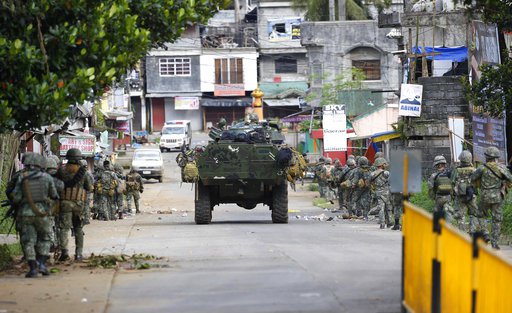Economic risk

Philippine marines walk to the frontline in the continuing assaults to retake control of some areas of Marawi city Sunday, May 28, 2017 in southern Philippines. Philippine forces launched fresh airstrikes Sunday to drive out militants linked to the Islamic State group after days of fighting left corpses in the streets and hundreds of civilians begging for rescue from a besieged southern city. (AP Photo/Bullit Marquez)
As far as the business community is concerned, President Duterte’s declaration of martial law in Mindanao was a decisive action necessary to restore peace and order in the South. While a few commented that it was an “overkill” considering that the crisis was limited to Marawi City in Lanao del Sur, the majority believed that martial rule was needed to nip the problem in the bud.
But such an action is not without economic cost. The first casualty will be tourism. Foreign governments have issued advisories to their citizens against travel to Mindanao. Even local private companies have suspended trips by their staff to the South. The hometown of the President, Davao City, could suffer most as it is a favorite among tourists and one of the destinations being promoted by the Department of Tourism to foreigners. In 2016, Davao del Norte and Davao del Sur saw a 12-percent jump in tourist arrivals to 3.6 million.
Another risk is that prices of basic goods could shoot up. A price freeze to prevent unscrupulous traders from jacking up prices of basic goods is now in effect in Mindanao. Under the Price Act (Republic Act No. 7581), an automatic price freeze or price control at current prices is in effect for 60 days for basic goods and 15 days for liquefied petroleum gas and kerosene from the day martial law was declared or until lifted by the President. However, as movement of goods could be curtailed by the tightened security in Mindanao, the law of supply and demand will be at play. With shorter supply, prices are bound to rise despite the price freeze order.
The impact on the whole economy will be negligible. The Autonomous Region in Muslim Mindanao, where Marawi is located, accounted for a mere 0.6 percent or P50.6 billion of the P8.1-trillion gross domestic product (GDP) last year—the smallest share among the Philippines’ 17 regions. The whole of Mindanao contributed 14.4 percent to last year’s GDP.
President Duterte last week decided to put Mindanao under martial rule following the clash between soldiers and Islamist militants in Marawi. Mr. Duterte, who was in Moscow at that time, was forced to cut short his four-day official visit to Russia to return to the Philippines and take charge. The reaction of financial markets was limited. The peso weakened slightly the day after, hitting 49.995 to a dollar from 49.82 the previous day. But the weakness was regional following the surprise Moody’s credit-rating downgrade of China by a notch. The Philippine Stock Exchange index, on the other hand, ended the day slightly higher.
Outgoing Bangko Sentral ng Pilipinas Governor Amando Tetangco Jr. was also positive. While there could be some “transitory or temporary cautiousness” in the market due to the developments in Mindanao, he stressed that it would lead to a “positive impact on sentiment” in the end.
What is important now is how the government will make use of martial rule to achieve peace and order in Mindanao. Martial law should not be in effect for a long period. Investors can wait and see for only a limited time. It is not as if the Philippines is the only investment site available to them. Martial rule in the South should be in effect for the shortest time possible. Otherwise, investors will think that not all is well here.
From all indications, the President will make use of martial law to address a threat to internal security and check terrorism at the root to prevent it from spreading to other parts of the country. While solutions have eluded previous governments in fighting lawlessness in Mindanao, it is hoped that his reliance on martial law will prove more successful.
What is worrisome is the President’s statement that he could place the entire country under martial rule. He said he was considering declaring martial law in the Visayas as well, and that martial rule could be expanded to the whole country if the terror threat is found to be present in other parts of the Philippines. This, we believe, will be a different story altogether, with far greater economic risk.




















